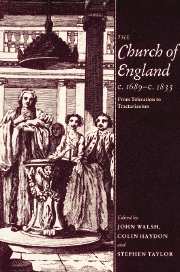Book contents
- Frontmatter
- Contents
- Preface
- List of Abbreviations
- 1 Introduction: The Church and Anglicanism in the ‘long’ eighteenth century
- Part I The pastoral work of the Church
- Part II Crisis and reform
- Part III Identities and perceptions
- 13 The eighteenth-century Church: a European view
- 14 Portrait of a High Church clerical dynasty in Georgian England: the Frewens and their world
- 15 ‘Papist traitors’ and ‘Presbyterian rogues’: religious identities in eighteenth-century Lancashire
- 16 Church parties in the pre-Tractarian Church of England 1750–1833: the ‘Orthodox’ – some problems of definition and identity
- Index
15 - ‘Papist traitors’ and ‘Presbyterian rogues’: religious identities in eighteenth-century Lancashire
Published online by Cambridge University Press: 13 October 2009
- Frontmatter
- Contents
- Preface
- List of Abbreviations
- 1 Introduction: The Church and Anglicanism in the ‘long’ eighteenth century
- Part I The pastoral work of the Church
- Part II Crisis and reform
- Part III Identities and perceptions
- 13 The eighteenth-century Church: a European view
- 14 Portrait of a High Church clerical dynasty in Georgian England: the Frewens and their world
- 15 ‘Papist traitors’ and ‘Presbyterian rogues’: religious identities in eighteenth-century Lancashire
- 16 Church parties in the pre-Tractarian Church of England 1750–1833: the ‘Orthodox’ – some problems of definition and identity
- Index
Summary
On Sunday 19 January 1690, the Reverend Henry Newcome, Senior, grand old man of Manchester Presbyterianism, found himself‘much disturbed by the rabble throwing snowballs’. ‘But alas,’ he wrote in his diary, ‘it is but what these late times has bred them to. No matter how profane they be, if they be not Presbyterians.’ He rested secure, however, in the protection he felt under the new regime, finding ‘it is a mercy that they have not a present power to disturb us, though we cannot restrain them’. By ‘disturb’, Newcome seems to have meant physical violence, but he could not prevent the verbal abuse of his neighbours. Later that spring he recorded an incident in which ‘A poor miller at Knotmill, as I was coming home, cursed me, and bade the devil go with all Presbyterians.’
Eighteenth-century England has generally been regarded as a society that was particularly tolerant of religious diversity. The Revolution settlement had retained the state Church and denied full political participation to all; but in law or in practice most English men and women of the period had far more freedom of worship than their contemporaries on the Continent. The Civil War seems to have slaked the English thirst for religious bloodletting, and in the eighteenth century most religious violence was focused on the destruction of property rather than people.
- Type
- Chapter
- Information
- The Church of England c.1689–c.1833From Toleration to Tractarianism, pp. 317 - 333Publisher: Cambridge University PressPrint publication year: 1993
- 3
- Cited by



